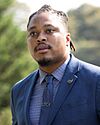Democratic National Committee facts for kids
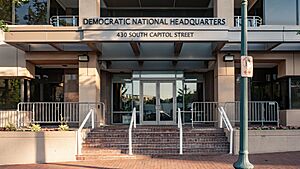
DNC Headquarters in Washington, D.C., 2024
|
|
| Founded | May 26, 1848 |
|---|---|
| Location |
|
|
Key people
|
Chair: Ken Martin Vice Chairs: Reyna Walters-Morgan Artie Blanco Jane Kleeb Malcolm Kenyatta Shasti Conrad Finance Chair: Chris Korge Secretary: Jason Rae |
| Affiliations | Democratic Party |
The Democratic National Committee (DNC) is the main group that leads the Democratic Party in the United States. It helps guide the party between big meetings called National Conventions. The DNC works to support Democratic candidates across the country. This includes candidates for local, state, and national jobs. It also helps create the party's main ideas and goals, known as the party platform.
The DNC was started on May 26, 1848, at the Democratic National Convention that year. The DNC has a similar group for the Republican Party, called the Republican National Committee.
| Top - 0-9 A B C D E F G H I J K L M N O P Q R S T U V W X Y Z |
What the DNC Does
The DNC's job is to share and promote the Democratic Party's ideas. It also helps organize the party's activities. Every four years, the DNC organizes the Democratic National Convention. At this convention, the party chooses its candidates for President and Vice President of the United States. After that, the DNC helps with the Presidential campaign.
The DNC focuses more on how to run campaigns and organize the party. It helps raise money, does surveys to see what people think, and plans campaign strategies. When a Democrat is president, the DNC usually works very closely with the president and the White House.
Who is in the DNC?
The DNC is led by a chairperson, five vice chairpersons, a treasurer, a secretary, and a finance chair. These leaders are chosen by the members of the DNC.
The committee also includes:
- Two people from each state or U.S. territory's Democratic committee.
- 200 more members from different states, based on their population. These members are chosen by voters or state party groups.
- Two extra members from each U.S. territory.
- The Democratic leaders in the U.S. Senate and House of Representatives.
- Three Democratic governors, mayors, county officials, state lawmakers, and city officials.
- Three representatives from groups like the Young Democrats of America and the National Federation of Democratic Women.
- Two representatives from groups like the College Democrats and the High School Democrats of America.
- Eight representatives from Democrats Abroad, who have half a vote each.
- Up to 75 more members chosen by the committee itself.
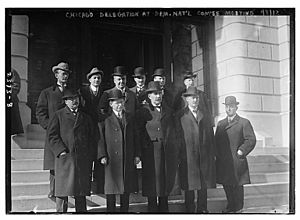
All DNC members are called "superdelegates" at the Democratic National Convention. These are party leaders and elected officials who can vote at the convention. They can affect the outcome of a close primary race if no candidate wins a clear majority of other delegates.
The DNC sets the rules for how states choose their delegates for the convention. However, the actual voting events, like primaries and caucuses, are usually run by each state.
The Association of State Democratic Chairs (ASDC) is a group within the DNC. It brings together the leaders of state and territory parties. The president of the ASDC is also a vice chair of the DNC. Jane Kleeb became the president of the ASDC in 2025.
The DNC meets at least once a year. A smaller group, called the Executive Committee, handles the party's daily work. It meets at least every three months. There is also a National Advisory Board that helps with fundraising and advice. The current chair is Elizabeth Frawley Bagley.
Current DNC Leaders
Ken Martin became the DNC chair on February 1, 2025.
| Image | Name | Position | Notes |
|---|---|---|---|
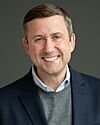 |
Ken Martin | Chair | |
| Reyna Walters-Morgan | Vice Chair, Civic Engagement and Voter Participation | ||
| Artie Blanco | Vice Chair | ||
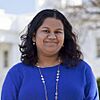 |
Shasti Conrad | ||
| Malcolm Kenyatta | |||
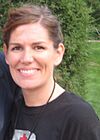 |
Jane Kleeb | ASDC President | |
| Chris Korge | Finance Chair | ||
 |
Virginia McGregor | Treasurer | |
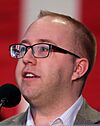 |
Jason Rae | Secretary |
Other important people who help run the DNC include:
- Executive Director: Roger Lau
- Political Director: Alana Mounce
- Chief of Staff: Anatole Jenkins
History of the DNC
The DNC has been around since 1848. It was created at the Democratic National Convention that year. Benjamin F. Hallett was its first chairperson.
In 1925, Franklin D. Roosevelt suggested that the DNC should have a permanent office. This would help it work all the time, like a business. In 1929, John J. Raskob helped set up the first permanent DNC headquarters in Washington, D.C.
Watergate Incident
In the 1970s, the DNC's office was broken into. This happened at the Watergate complex. This event was part of a big political scandal involving President Richard Nixon's administration.
Fundraising Issues
There were claims in the 1990s that a foreign country tried to influence American politics. In 2002, the DNC was fined $115,000. This was for problems with how it raised money in 1996.
Computer Attacks
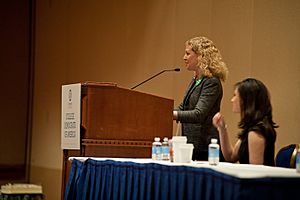
The DNC's computer networks have faced cyber attacks and hacks.
- In 2015 and 2016, two different foreign intelligence groups were found on the DNC's computer systems. They looked at emails and other information. They were removed from the system in June 2016.
- A hacker known as Guccifer 2.0 claimed to have hacked the DNC. This hacker then shared DNC emails with a newspaper. Investigators now believe Guccifer 2.0 was working for a foreign military intelligence service.
2016 Email Leak
On July 22, 2016, a website called WikiLeaks released about 20,000 DNC emails. Some people said these emails showed that the DNC unfairly favored Hillary Clinton. They claimed the DNC worked against her main opponent, Bernie Sanders. A former DNC leader, Donna Brazile, later confirmed some of these claims.
Because of these leaked emails, several DNC leaders resigned. This included Chairperson Debbie Wasserman Schultz. The DNC later filed a lawsuit against WikiLeaks and others. They claimed there was a plan to influence the election.
See also
 In Spanish: Comité Nacional Demócrata para niños
In Spanish: Comité Nacional Demócrata para niños
- Green National Committee
- Libertarian National Committee
- Republican National Committee
- Information published by WikiLeaks
 | Chris Smalls |
 | Fred Hampton |
 | Ralph Abernathy |


